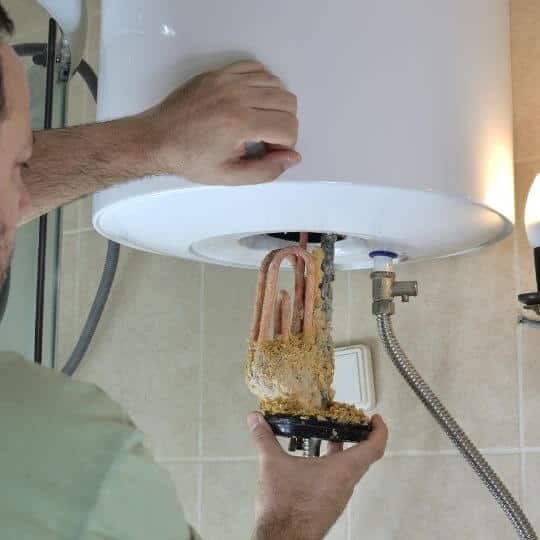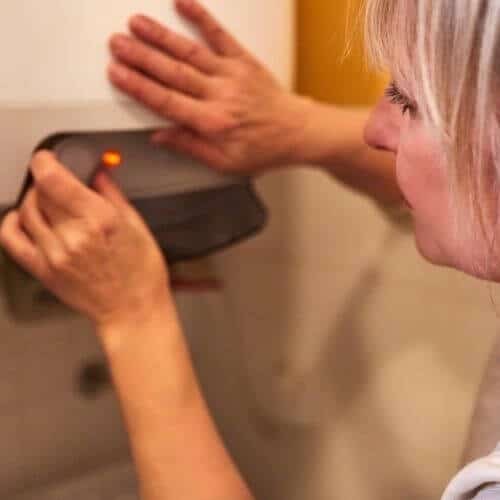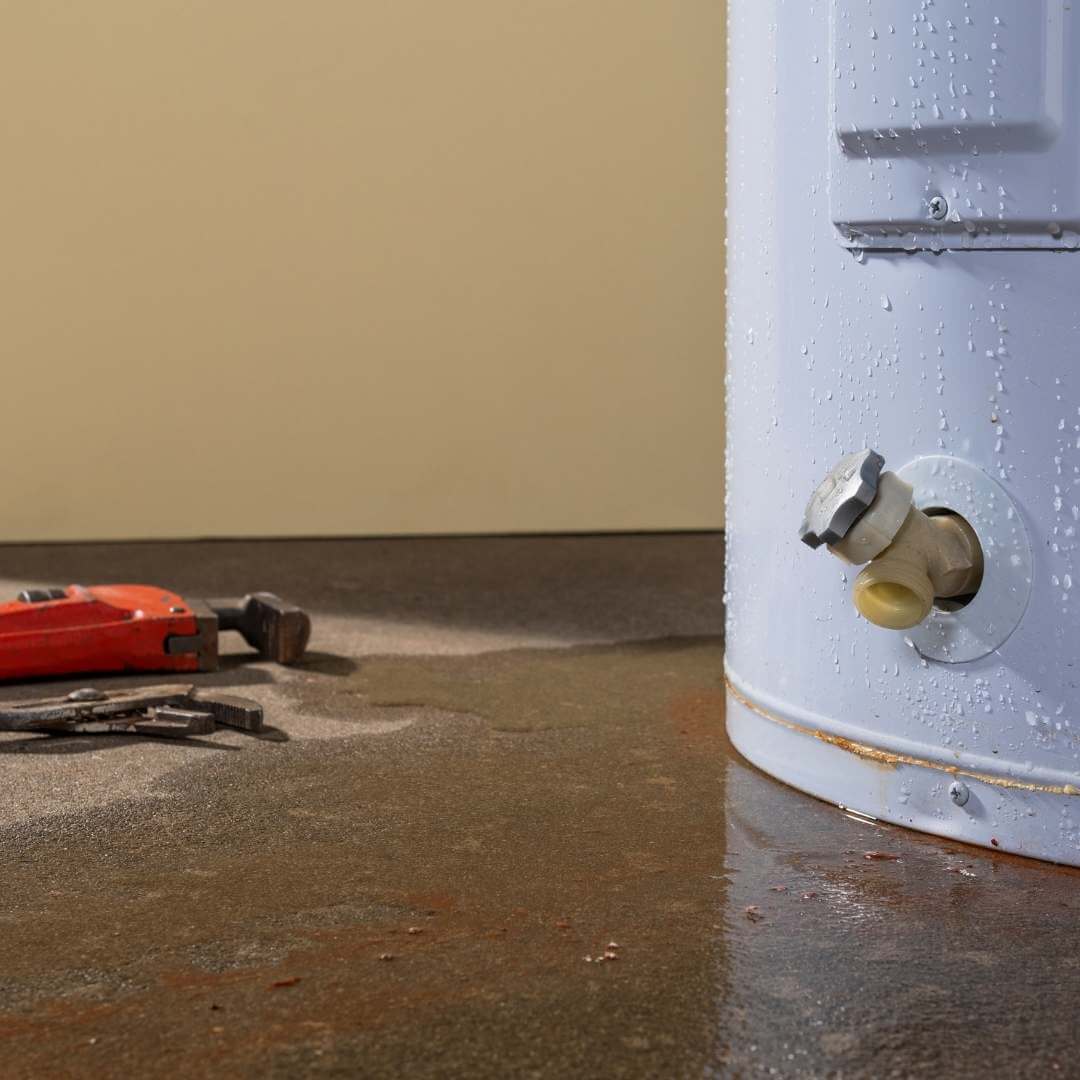With good maintenance, a water heater may last long. But eventually, the time comes, and it fails. This leads us to the question “Should I Replace my Hot Water Heater Before it Fails?”
It may not be a straightforward answer as many may presume because you need to know that the heater is about to fail.
To answer this question, we will equip you with sufficient knowledge about water heaters. If your dishwasher and sink bring in cold water, it may be time for that replacement. Sometimes your laundry won’t wash perfectly in the washing machine too. These include some of the signs that your heater requires a replacement.
So, you may need to do so soonest to avoid hazardous outcomes in your home.
Should I Replace my Hot Water Heater Before it Fails

Like diseases, water heaters may present failing symptoms. However, if you catch them early, you might get lucky and replace them before it fails. Some signs include:
- You experience cold water– have you recently gone to the bathroom but found cold water instead of your regular hot. If this scenario has happened to you, it is the number one sign that you might need to replace your heater soon. Alongside cold water in the shower system, the dishwasher, washing machine, and sinks have similar results.
- You start drawing rusty water from your taps. If you notice brownish water, it will mean that your water heater might be heading to a replacement. The rusting happens when the valve and pressure valve allows for rust to build up.
The buildup leads to leakages and heater failure. The water outlets and inlets may also form rust.
Rust contributes to most electric fixtures damages, which could damage your heater.
- A popping sound along with your water heater’s location. A popping sound develops after sediments and minerals clog your water heater, thus blocking the drain pipe. Silt and rust cause major blockages and contribute highly to heater failure. You need to perform regular maintenance to prevent this blockage. Reducing the chances of sediment buildup increases the chances of longer water heater survival.
- Have you noticed that your water heater might be leaking? Leaking serves as a major signal that things may soon go south. Leaking results from severe sediment buildups. Sometimes, rusting may cause leaking.
All these signs serve as warning signs for your heater’s survival. If you notice excessive leaking, flushing your heater system helps remove the sediments causing blockages.
You may lengthen your heater’s lifespan through this simple act. These several methods are ideal for unclogging your drain valve (1).
Leaking may also result from the repeated expansion and contraction of the heating device over a long period. A crack or cracks develop, and as time goes by, your heater may start leaking.
If the leaking happens from the top heater chambers, you may fix the heater and move on. But if the leaking originates from the internal tank, it might mean bad news. The time for replacement might have arrived. Leaking comes with various risks, including:
- It might ruin your carpet and other home appliances. In addition, as the carpet soaks, it may pose a risk of water absorbance to other devices that may get damaged by water.
- You may slide and fall hence the risk of home accidents
- If water comes into contact with electrical devices, it may cause electrocution. Electrocution leads to death and should be avoided at all costs.
- Mold may develop from the moist ground and carpeting, leading to an unhealthy living environment.
- It causes an increase in utility bills when you lose water through leaking.
- Your water heater exceeds the recommended period. If you realize that your heater has lasted too long, it might mean that replacement time has neared. Most heaters may last 8 to ten years. If you know that you have caved in the 12-year mark, you need to start researching how to replace your water heater.
You will rule out old age by noticing rusty inlet valves. If rust takes hold of the valve region, it must have spread on the inside. This rust signifies old age, and there is no way to salvage the heater when this stage kicks in.
If your valves get rusty, it strongly indicates that you might need to request for heater replacement.
What might cause water heater failure?

Now that we have understood the signs of water heater failure, we need to understand the cause. For example, your water heater might be failing due to:
- Drain pipe blockages– if the drain pipe gets blocked, you may experience rusting, resulting in heater failure.
- Old age– as the heater approaches its time limit and sometimes exceeds, it gets susceptible to various mechanical problems. Eventually, it may break down.
- Poor maintenance– if you need your heater to serve you longer, you may invest in good maintenance. Consult a qualified plumber every few months and get all the sediments flushed out. This way, your drain pipe, and valves will serve you longer.
Why should you replace your failed water heater?

It would help if you replaced your failed heater to minimize several effects that may arise. Also, may need your comfortable life back and not worry about cold water when you shower or use the skin. So, here’s why you should replace your heater once it fails.
- To avoid the inconveniences of a failed water heater. Once you get used to using hot water for your home chores, you won’t get comfortable doing the same task with cold water. So to avoid cold water inconveniences, you will have to replace that water heater.
- To avoid water damage. Once a heater heads to failure and finally fails, leaking includes some of the major signs. You might slowly lose many gallons of water from a leaking heater system. To avoid water wastage, you need to replace your heater.
- To cut down on bills. Water comes with water bills like other home bills. If you keep losing water through leaking, you pay bills for something you haven’t used. If you replace your heater, these bills go down.
- To help prevent unnecessary accidents. Have you ever thought of the dangers of a leaking system? It leads to accidental falls or electrocution if water comes into contact with electric circuits. These dangers have cost many people their lives, and you won’t need it happening to you. Also, the rusty water from pipes may cause health risks if you drink the water directly from the tap. Molds that result from the moist surface contribute largely to health hazards in the home. By replacing your failed water heater, you keep all these menaces away.
Should I replace or repair my water heater?

Most people have once had to wonder whether to repair or replace their water heater. Of course, we try to avoid the latter due to the high costs. But sometimes, it gets inevitable. For instance, you will need to repair your water heater if?
- You have not exceeded its lifespan period. Most heaters will serve us up to 12 years. However, the manufacturer may have given the device 10 years of service. If your heater starts showing failure signs after four years, you may repair it. So, it could be a fault from within that can fix the problem once repaired. However, if the signs come after exceeding the service period, I bet you will have to replace your heater. If you don’t, it eventually fails.
- You perform regular maintenance checks. When you regularly perform maintenance, you may spot a problem early enough. Once you have spotted it, it becomes easy to repair the heater before it worsens.This way, you have lengthened your heater’s lifespan. But without regular maintenance, you see the failing signs too late to start the repair and end up replacing your heater.
- You may repair your heater if your technician recommends it and you have spare parts. Sometimes plumbing repairs tend to be difficult due to a lack of spare parts. But you might save a few dollars when your plumber thinks he might repair your damaged heater parts and spares prove available.
- You may also repair your water heater if the repair cost doesn’t exceed 50% of what you may normally use to replace it. But if this cost goes over the 50% mark, then it’s recommended that you replace the entire thing. We say so because the repair may fail again shortly, and you end up using more funds than you could if you had replaced it.
- You need to replace your water heater if its tank has a serious leak. Leaks serve to notify you of a serious issue with your water heater. For example, if you notice a leak on the top of your water heater, you may get a slim chance of a repair. But if the leak appears on the bottom of the tank, then repairing it might be a problem, and you need to replace it.
Who changes water heaters, or should I do it by myself?
You may replace a water heater by yourself or hire a licensed plumber. If you have knowledge of replacing a water heater and may perform any required electrical modifications, go ahead and replace it. But if you find it challenging and there exist jurisdictions on plumbing fixtures, we recommend that you hire a licensed professional for the task. Most plumbing needs don’t fit in the DIY category since you may affect the entire plumbing or do it wrong.
You may also require building or electrical permits to perform a replacement. Permits work to prevent improper installations that may lead to:
- Explosion. If you install the heater and fail to install a temperature and pressure valve properly, then chances are that the heater might explode. Unfortunately, most people die due to such mistakes, and the state has established regulations to prevent such.
- If you possess a gas water heater, it comes with a gas pipe that requires proper installation. Failure to properly install the gas pipe may lead to gas leaks causing a fire. Again, the state requires you to obtain a permit always to keep the safety standards high.
- Electrical risks. Electrical water heaters come with wiring recommendations. You need to perform the wiring properly to reduce the chances of electrocution. If the wires come into contact with the tank or water, you may be electrocuted to death. So, you need to ensure the wiring gets done right to prevent this.
- Also, if you increase your water heater size, you will require a larger electrical wire. Also, you might need a circuit breaker to release the proper electric voltage. All these factors need to be put into consideration by a licensed plumber.
- Code changes. The codes of plumbing and heater fixtures keep changing. You need to understand the new codes to conduct a proper water heater installation. Hence, a licensed plumber needs to help with replacing the water heater.
What to check for when replacing your water heater

We have seen that sometimes replacing your water heater by yourself might be possible. Also, the following areas require more attention during water heater replacement if you are a plumber.
- Check to ensure the vent installation for gas water heaters gets done properly. You check this by ensuring no gaps exist between the vents to prevent the gas from escaping the system. You will therefore minimize the risks of gas leaking that may cause fires.
- Have you conducted the seismic strapping? Seismic strapping helps hold your water heater in place in an earthquake. If the heater isn’t strapped properly, it may cause death or damage to property in case of an earthquake.
- Your gas line. Check to see if the gas line comes in rigid aluminum. It should get removed since most plumbing, and building jurisdictions don’t accept aluminum tubing.
What are the best water heaters to invest in your home?

Now that water heater replacement and repair have come into our discussion, you might be wondering which heater may last longer. If you invest in a long-lasting water heater, then it will serve you long before the need for a replacement arises. The following tips prove helpful.
- Reci-2500 water heater. This water heater has a long lifespan and proves durable. If you find it in the market, then it’s a good shot.
- Look for the best brands of water heaters. Some of the best water heater brands include Crompton geysers, Havells geysers, AO smith geysers, Ecosmart, Bosch and Bajaj geysers.
- Tankless water heaters prove convenient and most preferred water heaters.
- If you find electric water heaters, they serve more reliably than their gas counterparts.
- Also, check the lifespan of water heaters before purchasing. A water heater with a longer lifespan will serve you best.
Water heater replacement costs- 50 gallons
Water heater replacement costs vary depending on various factors. Mostly, the determining factors include brand and size.
If you need to replace a 50-gallon water heater, you will need between $ 1,100 and $ 2,800. A smaller water heater with fewer gallons will cost cheaper, while a larger than 50-gallon water heater will cost more.
Also, it will take a maximum of three hours to replace a 50-gallon water heater. This time proves ideal and achievable to restore your hot-water use.
Advantages of replacing your water heater
If your water heater has failed, you will need to replace it to enjoy the following benefits.
- You don’t get to use cold water for your home chores. Most dishwashers, washing machines, and bathroom showers run on hot water. If the water heater fails, hot water stops running in these fixtures.
- You reduce the chances of accidental falls resulting from leaks. For example, leaks may cause water to settle on the floor of your home. This water may lead to unintentional falls.
- You don’t have to worry about electrocution.
- You save on utility bills once you stop losing water through leaks.
- You improve the standard of your home
FAQ
When do you know when your heater needs replacing?
Your heater needs replacing if it’s too old, you notice rusty water from your water system, leaking, water heater noise, or your water comes out cold.
Should I replace my hot water heater before it fails?
Yes, you should.
Can a water heater last 20 years?
It might be unusual for water heaters to last this long. However, most of them serve a maximum of 12 years.
Final Thought
If you notice that your water heater might be failing, you need to replace it. Failure to do so might lead to accidents and health hazards to people living in the home. If the heater has served you long enough, replacing it will be the best option. Although it may seem expensive, ensure you invest in a good brand that will serve you the longest.

Michael Davis is a heating & plumbing expert who currently works as independent contractor in SC. He also writes for Plumbertip.
For almost 10 years he worked on various plumbing tasks across South Carolina.


